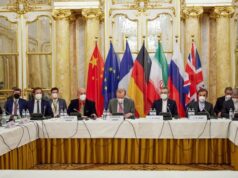USA hikes key rate by 0.25 point, signalling pause in inflation battle

The U.S. Federal Reserve on Wednesday raised its benchmark interest rate by 0.25 percentage point, pressing on with its aggressive monetary tightening campaign to curb decades-high inflation, but signalled a pause in its cycle of rate hikes may come soon.
Amid further financial turmoil following the collapse of California-based First Republic Bank, another increase brings the federal funds rate, which banks charge each other for overnight borrowing, to a new target range of 5 to 5.25 percent, a level not seen since 2007.
The 10th consecutive hike since March 2022 was announced after a two-day meeting of the policy-setting Federal Open Market Committee as it attempts a delicate balancing act between lowering high prices and dodging a recession.
In a statement released after the meeting, the central bank hinted at a potential departure from its tightening cycle, which has lifted the key rate from nearly zero in just over a year, by taking out a sentence used last time.
The committee no longer said it “anticipates that some additional policy firming may be appropriate in order to attain a stance of monetary policy that is sufficiently restrictive to return inflation to 2 percent over time.”
Fed Chair Jerome Powell told a press conference that dropping the wording is a “meaningful change.”
Instead, the FOMC said that “in determining the extent to which additional policy firming may be appropriate to return inflation to 2 percent over time,” it will scrutinize upcoming economic data and various other factors.
Asked a number of times about the possibility of pausing interest rate increases in the not-so-distant future, Powell was careful with his words, emphasizing that inflation remains high and no course has been set.
“We will make that determination meeting by meeting, based on the totality of incoming data and their implications for the outlook for economic activity and inflation,” he said. “And we are prepared to do more if greater monetary policy restraint is warranted.”
As the meeting took place on the heels of the failure of First Republic, he also stressed that the U.S. banking system is “sound and resilient.”
But he warned that tighter credit conditions, resulting from the bankruptcy of U.S. regional lenders earlier this year, are “likely to weigh on economic activity, hiring and inflation. The extent of these effects remains uncertain.”
When it last raised the interest rate, also by 0.25 percentage point, in March, global financial markets were reeling from the demise of Silicon Valley Bank, a major U.S. lender for startups, and Signature Bank, a New York-based lender that had deep connections with the cryptocurrency industry.
Amid lingering contagion fears, U.S. regulators on Monday seized control of First Republic, making it the second-largest bank to fail in U.S. history.
The earlier pair of bank failures had rocked public trust in regional lenders, causing First Republic, a midsize bank that specialized in private banking for wealthier customers, to suffer a rapid loss of more than $100 billion in deposits in the weeks leading up to its collapse.




